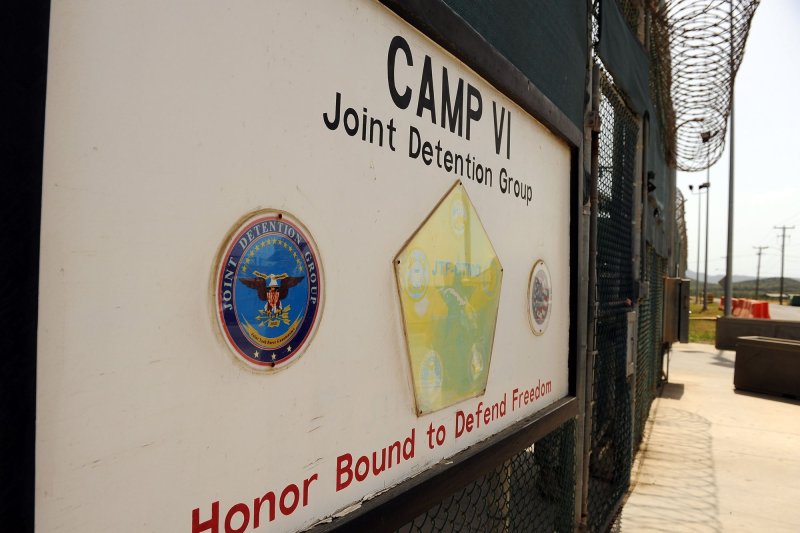Pentagon halts plan to vaccinate Guantanamo Bay detainees

A sign for Camp VI in Camp Delta where detainees are housed is seen at Naval Station Guantanamo Bay in Cuba in this July 2010 photo. Roger L. Wollenberg/UPI | License Photo
Jan. 30 (UPI) -- The Pentagon is pausing a plan to vaccinate detainees at Guantánamo Bay against COVID-19 after a backlash over the Defense Department's priorities.
"No Guantanamo detainees have been vaccinated. We're pausing the plan to move forward, as we review force protection protocols," Pentagon spokesman John Kirby wrote on Twitter Saturday. "We remain committed to our obligations to keep our troops safe."
Forty wartime prisoners are detained at the Guantánamo Bay detention camp in Cuba, including Khalid Shaikh Mohammed, the accused mastermind of the Sept. 11, 2001, attacks, as well as six men who have been cleared for release by an interagency government panel.
Earlier this week The New York Times reported that the Department of Defense had decided to offer the vaccine to prisoners starting next week.
Medical workers at the U.S. naval base began vaccinating its 6,000 residents, including 1,500 troops assigned to the detention center, on Jan. 8.
The announcement that terrorism suspects could receive the vaccine as well sparked a backlash among conservatives, with Rep. Kevin McCarthy, the top House Republican, writing, "President Biden told us he would have a plan to defeat the virus on day 1," on Twitter. "He just never told us that it would be to give the vaccine to terrorists before most Americans."
The detention camp was opened by then-President George W. Bush in 2002 to detain enemy combatants in the War on Terror.
RELATED New COVID-19 variants found in Arizona, Maryland; U.S. surpasses 26M cases
The camp's existence has drawn criticism from human rights organizations for violations of due process, as some detainees have awaited trial.
The lack of vaccinations has been an obstacle to resuming pretrial hearings in the Sept. 11 case, because almost everyone involved in the hearings -- save the prisoners -- commutes to the court from elsewhere, and vaccinating the prisoners, lawyers, judge and court staff has not been a priority.
As recently as three weeks ago, when Amnesty International released a report describing Guantánamo as the center of "ongoing and historic" human rights abuses, critics have cited a lack of adequate medical care as an ongoing problem at the site.
President Barack Obama promised to close the detention center during his 2008 campaign, but was stymied by Congressional opposition, and in 2018 then-President Donald Trump signed an executive order saying it would stay open indefinitely.
But as recently as last March, Pentagon officials said they were considering "right-sizing" the number of staff at the facility, which at the time employed 1,800 troops -- 45 for each man held there -- with an operating cost of $13 million per prisoner.

A sign for Camp VI in Camp Delta where detainees are housed is seen at Naval Station Guantanamo Bay in Cuba in this July 2010 photo. Roger L. Wollenberg/UPI | License Photo
Jan. 30 (UPI) -- The Pentagon is pausing a plan to vaccinate detainees at Guantánamo Bay against COVID-19 after a backlash over the Defense Department's priorities.
"No Guantanamo detainees have been vaccinated. We're pausing the plan to move forward, as we review force protection protocols," Pentagon spokesman John Kirby wrote on Twitter Saturday. "We remain committed to our obligations to keep our troops safe."
Forty wartime prisoners are detained at the Guantánamo Bay detention camp in Cuba, including Khalid Shaikh Mohammed, the accused mastermind of the Sept. 11, 2001, attacks, as well as six men who have been cleared for release by an interagency government panel.
Earlier this week The New York Times reported that the Department of Defense had decided to offer the vaccine to prisoners starting next week.
Medical workers at the U.S. naval base began vaccinating its 6,000 residents, including 1,500 troops assigned to the detention center, on Jan. 8.
The announcement that terrorism suspects could receive the vaccine as well sparked a backlash among conservatives, with Rep. Kevin McCarthy, the top House Republican, writing, "President Biden told us he would have a plan to defeat the virus on day 1," on Twitter. "He just never told us that it would be to give the vaccine to terrorists before most Americans."
The detention camp was opened by then-President George W. Bush in 2002 to detain enemy combatants in the War on Terror.
RELATED New COVID-19 variants found in Arizona, Maryland; U.S. surpasses 26M cases
The camp's existence has drawn criticism from human rights organizations for violations of due process, as some detainees have awaited trial.
The lack of vaccinations has been an obstacle to resuming pretrial hearings in the Sept. 11 case, because almost everyone involved in the hearings -- save the prisoners -- commutes to the court from elsewhere, and vaccinating the prisoners, lawyers, judge and court staff has not been a priority.
As recently as three weeks ago, when Amnesty International released a report describing Guantánamo as the center of "ongoing and historic" human rights abuses, critics have cited a lack of adequate medical care as an ongoing problem at the site.
President Barack Obama promised to close the detention center during his 2008 campaign, but was stymied by Congressional opposition, and in 2018 then-President Donald Trump signed an executive order saying it would stay open indefinitely.
But as recently as last March, Pentagon officials said they were considering "right-sizing" the number of staff at the facility, which at the time employed 1,800 troops -- 45 for each man held there -- with an operating cost of $13 million per prisoner.
No comments:
Post a Comment